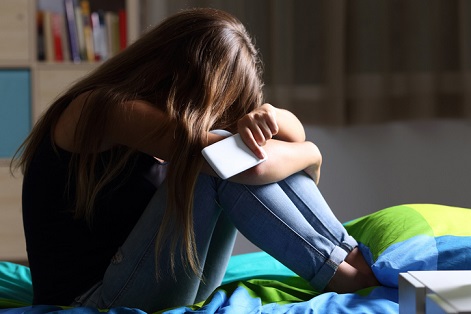
On January 3, when 14-year-old Amy “Dolly” Everett tragically took her life after being bullied online, it was just one of many poignant examples of how social media can be used for sinister purposes, and with devastating effect.
A big part of the problem is that those doing the bullying almost always hide behind the convenience of online anonymity, rendering their victims and their families helpless to take action against them.
So is it time for online anonymity to be put under the microscope?
Federal Education Minister, Simon Birmingham, addressed this issue on Thursday in a conversation on Sky News with Graham Richardson.
When asked by Richardson what he thought should be done about anonymous cyberbullies, Birmingham said teachers should be able to more easily “access personal mobile phones and personal applications” in schools.
“There are a number of steps that we’ve been taking over the last few years to try to get the law to keep up as best it can with all types of different areas of online abuse,” Birmingham said.
“This has included exploring the point at which we need to use technology in order to identify who the culprit is. Often people hide behind the potential for anonymity off these sites.”
Birmingham said that given the seriousness that threatening behaviour online can have, it’s “reasonable” for the government to look at whether existing powers are appropriate to “get to the bottom of that type of behaviour.”
“There are already new laws already before the Parliament to provide some further capacity in terms of our ability to respond to inappropriate online behaviour,” Birmingham added.
To mitigate the potential risks posed by mobile phones, some schools, including Brisbane’s Kimberley College, maintain strict policies.
The College’s principal, Paul Thomson, said he agrees with the Minister's idea of banning mobile phones.
“When you hand a child a mobile phone you are giving him a video camera, a powerful computer, a means of sending deadly messages, and access to a repository of social smut,” Thomson told The Educator.
“This is as clever as handing a child a loaded gun and saying ‘don't pull the trigger, will you?’ I researched the impact of screen life for most of the Christmas holidays and the news is very concerning.”
The College has a program called ‘Invictus’, which is a three-day conference for students from years 7 to 12 and includes speakers discussing online safety.
Thomson said he has also designed a term-long unit regarding the internet, adding that students at the end of the term will present their findings to their parents in the form of evening seminars.
“Our bullying policy extends to cyberbullying, whether this takes place outside of school hours or not. These cases are viewed as serious breaches of the anti-bullying code, and enrolments may be terminated as a consequence," Thomson said.
Other schools have turned to apps to help them to keep track of what students are doing on their smartphones. One of these is an app called Family Zone, which was launched in 2014 to help schools and parents improve the digital safety of children.
For the schools to use the technology, they must first have permission from parents, but can then enact a tamper-proof app and a portal that allows schools – and the parents – to monitor what websites, messages and apps students use.
However, privacy groups, such as the Australian Privacy Foundation (APF) have labelled the technology “a privacy intrusion”
Birmingham acknowledged that access to phones can be a difficult issue for schools, as it is for parents, but said “this is why clear policies and support to keep distractions out of the classroom are essential”.
“Those running school systems need to lead from the front with firm policies that ensure the problem isn’t just left to hardworking teachers and principals,” Birmingham said.
“Although learning to work with technology is essential, phones can be a distraction from lessons and a platform for bullying unless schools have the right policies in place.”
Related stories:
Govt calls for ban on smartphones in schools
Premier’s new council takes aim at bullying
Student mental health concerns double


